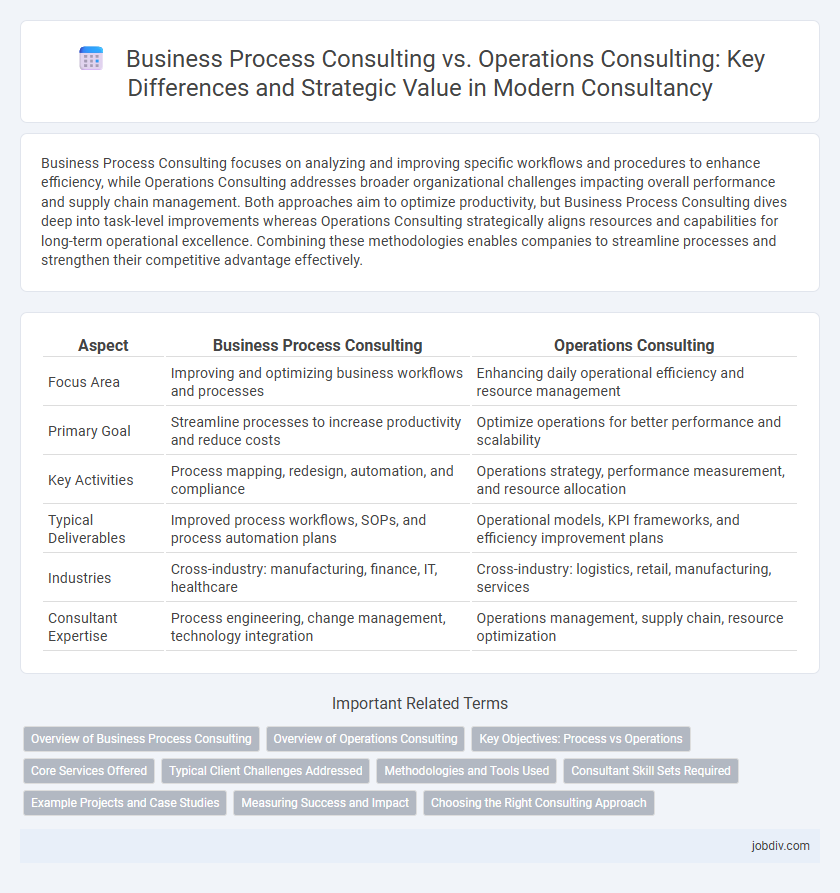Business Process Consulting focuses on analyzing and improving specific workflows and procedures to enhance efficiency, while Operations Consulting addresses broader organizational challenges impacting overall performance and supply chain management. Both approaches aim to optimize productivity, but Business Process Consulting dives deep into task-level improvements whereas Operations Consulting strategically aligns resources and capabilities for long-term operational excellence. Combining these methodologies enables companies to streamline processes and strengthen their competitive advantage effectively.
Table of Comparison
| Aspect | Business Process Consulting | Operations Consulting |
|---|---|---|
| Focus Area | Improving and optimizing business workflows and processes | Enhancing daily operational efficiency and resource management |
| Primary Goal | Streamline processes to increase productivity and reduce costs | Optimize operations for better performance and scalability |
| Key Activities | Process mapping, redesign, automation, and compliance | Operations strategy, performance measurement, and resource allocation |
| Typical Deliverables | Improved process workflows, SOPs, and process automation plans | Operational models, KPI frameworks, and efficiency improvement plans |
| Industries | Cross-industry: manufacturing, finance, IT, healthcare | Cross-industry: logistics, retail, manufacturing, services |
| Consultant Expertise | Process engineering, change management, technology integration | Operations management, supply chain, resource optimization |
Overview of Business Process Consulting
Business Process Consulting specializes in analyzing and redesigning workflows to enhance efficiency, reduce costs, and improve overall organizational performance. It involves detailed process mapping, identifying bottlenecks, and implementing best practices tailored to specific industry standards. This consulting approach leverages methodologies such as Six Sigma and Lean to optimize operational processes and drive sustainable business improvements.
Overview of Operations Consulting
Operations consulting focuses on improving the efficiency and effectiveness of an organization's internal processes, including supply chain management, production workflows, and service delivery optimization. It involves analyzing operational performance metrics, identifying bottlenecks, and implementing strategies to reduce costs while enhancing quality and speed. This consulting area leverages data-driven insights and industry best practices to help businesses achieve scalable and sustainable operational improvements.
Key Objectives: Process vs Operations
Business Process Consulting primarily targets optimizing and redesigning workflows to enhance efficiency, reduce costs, and improve overall process quality within an organization. Operations Consulting focuses on streamlining day-to-day activities, resource allocation, and performance management to maximize operational effectiveness and deliver consistent results. Both approaches aim to drive organizational success, with Business Process Consulting emphasizing process innovation and Operations Consulting concentrating on operational stability and scalability.
Core Services Offered
Business Process Consulting primarily focuses on optimizing workflows, enhancing efficiency, and redesigning operational processes to improve overall business performance. Operations Consulting emphasizes the implementation and management of supply chain logistics, production management, and cost reduction strategies to drive operational excellence. Core services for Business Process Consulting include process mapping, analysis, and reengineering, while Operations Consulting offers services like capacity planning, quality control, and inventory management.
Typical Client Challenges Addressed
Business Process Consulting primarily addresses challenges related to inefficient workflows, process bottlenecks, and lack of standardization, helping clients improve operational efficiency and reduce costs. Operations Consulting focuses on optimizing resource allocation, supply chain management, and production scheduling to enhance overall organizational performance. Both consulting types target client pain points such as poor process integration, misaligned operational goals, and underutilized assets to drive sustainable growth and competitive advantage.
Methodologies and Tools Used
Business Process Consulting emphasizes methodologies such as Lean Six Sigma and BPMN (Business Process Model and Notation) to analyze and improve workflows for efficiency and quality. Operations Consulting utilizes tools like ERP systems, supply chain analytics, and capacity planning software to optimize day-to-day functions and resource management. Both rely on data-driven approaches, but Business Process Consulting focuses on redesigning processes while Operations Consulting targets operational performance and execution.
Consultant Skill Sets Required
Business Process Consulting demands expertise in process mapping, workflow optimization, and change management to enhance organizational efficiency. Operations Consulting requires strong analytical skills, operational strategy development, and supply chain knowledge to improve day-to-day business functions. Both roles benefit from proficiency in data analysis, project management, and stakeholder communication to drive successful implementations.
Example Projects and Case Studies
Business Process Consulting projects often involve redesigning workflow systems to improve efficiency, such as automating invoice processing for a retail chain, resulting in a 30% reduction in cycle time. Operations Consulting case studies commonly highlight supply chain optimization, exemplified by a manufacturing firm that reduced production costs by 15% through lean inventory management. Both consulting types utilize data-driven analysis but differ in scope: process consulting targets specific workflows, while operations consulting addresses broader organizational performance.
Measuring Success and Impact
Business Process Consulting measures success through the optimization of workflows, reduction of process inefficiencies, and enhanced productivity metrics, delivering quantifiable improvements in cycle time and cost savings. Operations Consulting focuses on measuring impact by evaluating overall operational performance, resource utilization, and alignment with strategic goals, often using key performance indicators (KPIs) such as throughput, quality, and customer satisfaction. Both disciplines emphasize data-driven assessments but differ in scope, with Business Process Consulting targeting granular process enhancements and Operations Consulting addressing broader organizational effectiveness.
Choosing the Right Consulting Approach
Business Process Consulting focuses on analyzing and improving specific workflows and procedures to enhance efficiency and reduce costs, while Operations Consulting takes a broader view, optimizing entire organizational systems and resource management for long-term performance. Choosing the right consulting approach depends on the company's primary challenges: process-centric issues benefit from Business Process Consulting, whereas complex operational challenges require Operations Consulting strategies. Aligning consulting services with organizational goals ensures targeted improvements and maximized return on investment.
Business Process Consulting vs Operations Consulting Infographic

 jobdiv.com
jobdiv.com